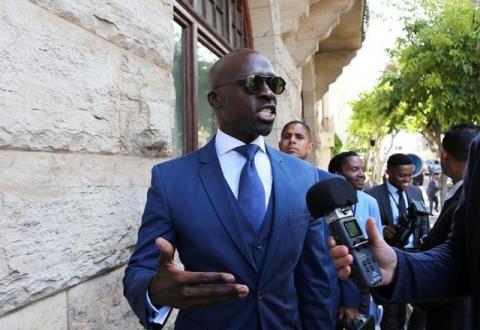Advertisement
Rating agencies downbeat on South African budget deficit, debt news
CAPE TOWN (Reuters) - South Africa's medium-term budget signals a policy shift by the Treasury away from commitments to cut deficits and debt and contains no plans to limit the damage to the economy, ratings firm Fitch said on Thursday.
In similar vein, S&P Global Ratings said the direction of South African politics will probably trump near-term macro-economic performance, particularly for the country's still-investment grade local currency credit rating.
Finance Minister Malusi Gigaba on Wednesday raised the Treasury's estimate for this year's budget deficit to 4.3 percent of gross domestic product from 3.1 percent in April, citing sluggish growth, shortfalls in revenue and costly bailouts to struggling state-owned companies.
He also halved this year's economic growth forecast and warned that sovereign debt levels would rise steeply in the coming years.
South Africa's rand extended losses on Thursday, falling to 11-month lows against the dollar while government bonds were also sharply weaker. Bank stocks fell 2.5 percent.
Rating firms are concerned about political jostling ahead of the African National Congress (ANC) conference in December to elect a new party leader to succeed President Jacob Zuma, who has battled several scandals including corruption allegations.
The worsening financial health of Africa's most industrialised economy has raised the risk sovereign credit-ratings downgrades but economists expect rating agencies to wait for the ANC conference before they make move.
Whoever the ANC picks is likely to take over from Zuma as South Africa's leader in 2019 when a national election is held.
"The change in direction of policy making, away from a focus on fiscal consolidation that we anticipated as a consequence of March's cabinet reshuffle, is under way and occurring faster than we had expected," Fitch said in a statement.
"We think that divisions in the ANC will persist beyond the party's electoral conference in December, and it is not clear that the political environment will become more conducive to consolidation."
Fitch and S&P rate South African foreign-currency debt in sub-investment, or "junk", territory. But only Fitch has the country's local-currency debt in junk.
Moody's rates both the foreign and local currency debt a notch above speculative grade.
S&P and Moody's are scheduled to review South Africa in November. Fitch has not published its review calendar for South Africa.
"Politics will probably trump the near-term macro-economic performance in South Africa particularly for the local currency rating," Frank Gill, one of S&P's top EMEA sovereign analysts.
'BAD NEWS'
Earlier Gigaba said it was difficult to predict how rating agencies would react to his maiden medium-term budget.
After Gigaba outlined government spending plans for the next three years on Wednesday, the rand fell to its lowest in 10 months against the dollar and bonds weakened.
"It's difficult for me to predict how the ratings agencies are going to react," Gigaba told a breakfast briefing. "We were announcing the bad news, we were opening up the books before the nation and say we have got a difficult story to tell."
A downgrade to South Africa's local currency debt by either S&P or Moody's would push the country's bonds out of widely used global bond indexes that rely on investment grades only.
"Overall, a downgrade and exclusion from the WGBI (World Government Bond Index) seems as though it is a foregone conclusion in the market," Reezwana Sumad, chief analyst at Nedbank, said.
"Given an extremely bearish MTBPS report, we believe the risks of credit ratings downgrades before year-end have risen materially."
(Additional reporting by Mfuneko Toyana in Johannesburg and Marc Jones in London; Writing by James Macharia; Editing by Jon Boyle)



















Add new comment